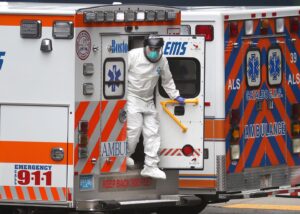The Boston Globe Supports The NEPBA Presumptive Bill For First Responders Who Are Victims of COVID-19

Help police and firefighters stricken by coronavirus
When first responders test positive for COVID-19, municipalities should assume they picked it up on the job.
There’s nothing like the long blue line of police mourning a fallen colleague to remind a community of the meaning of “first responder.”
And so it was for Boston police Officer Jose V. Fontanez, a 29-year veteran of the force and the first to fall victim to this vicious killer that wields neither gun nor knife.
As of last week, Boston police reported 71 confirmed cases of COVID-19 among its officers, and another 10 civilians tested positive, according to Boston Police Department spokesman Sergeant Detective John T. Boyle.
“They open doors every day where they have no idea what’s going to be on the other side,” Governor Charlie Baker said, paying tribute to Fontanez.
Fighting this silent killer isn’t the job most police and firefighters and EMTs signed up for, but it’s the one they’ve got now, and there’s little the public can do except make sure they are treated as the indispensable public servants they are if they do fall ill.
A bill filed last month by state Senator Michael Moore and Representative James Arciero, cochairs of the Committee on Public Safety and Homeland Security, and supported by more than four dozen lawmakers, would assure extended health-related benefits for all first responders.
Any first responders who require hospitalization, quarantine, or self-quarantine “as a result of being infected or coming into contact with someone who is infected with this virus, shall have their medical condition or incapacity to work presumed to be work-related,” the bill states.
It means that no public safety official would be required to use sick time or vacation time or any other kind of personal time off because he or she cannot report for work, and that time would be considered “duty time.”
It can be difficult, or impossible, to pinpoint where an individual picked up the coronavirus, which is why putting the onus on first responders to show their sickness is work-related would be so unfair. But it’s precisely that “presumption” part of the bill that the Massachusetts Municipal Association voiced its objections to in written testimony.
“Overcoming a presumption is very difficult because proof is required that exposures outside work caused the disease,” according to the testimony offered by MMA executive director Geoffrey Beckwith. “In the case of a pandemic with our current community spread, it would be nearly impossible to prove whether an employee contracted the virus on the job or outside of work.”
Well, precisely. That’s why the bill gives these front-line responders the benefit of that doubt.
Beckwith warned of the potential “massive, unaffordable and unnecessary new expenses on cities and towns” and asked the committee to come up with some kind of work-around. That included a “creating a COVID-19 paid sick leave program.”
The New England Police Benevolent Association, which is listed as a cosponsor of the bill, called Beckwith’s comments “heartless” and “despicable.”
But Moore indicated in an interview that he was sensitive to the “fiscal realities” facing cities and towns and would try to come up with a possible compromise that would aim to “make whole” first responders for the sick time used while not unduly burdening municipalities.
So far, Boston and the rest of Massachusetts have been relatively fortunate in the level of exposure of its first responders. New York City, by contrast, estimated that 1 in 6 of its officers is out either with the virus or because of exposure to it.
There is little in the way of personal protective equipment that can be offered to most first responders and there’s little in the way of personal distancing when a cop has to put cuffs on a suspect.
The emergency hazard health duty bill is one thing government can do to assure its first responders that they are valued — and that their sacrifices are recognized by the communities they serve.
